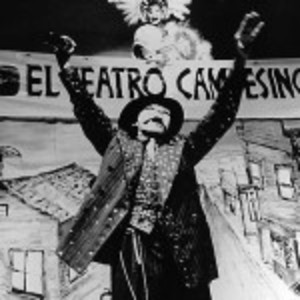Latinx Theatre

Introduction
Contemporary Latinx theatre examines the unfolding complexity of Latinx identity in America. The term ‘Latinx’ is a complex and emotionally-charged topic as individual usage variations (e.g. Latino, Hispanic, Chicano) depend upon factors such as generation, region, and personal inclination. There will therefore always be differences in opinion over the most suitable terminology to describe an individual and one should always defer to the individual’s own identification. The term Latinx derived more recently from American-born Latinos who sought a more gender neutral and inclusive term. It was used by the Latinx Theatre Commons (LTC), a national movement established in 2012 which seeks to promote Latino equity in American theatre.
For the purpose of this guide, Latinx plays are written by playwrights of Latin-American ancestry, notably Puerto Ricans, Cuban Americans, Dominican Americans, and Mexican Americans, who may or may not have been born in the US. Plays are often in English but sometimes in Spanish or so-called ‘Spanglish’ (a blend of Spanish and English). Latinx theatre usually tackles complex issues and controversies, such as immigration, social injustice, border politics, poverty, Latinx LGBTQ communities, and intergenerational relationships.
This guide will focus on the development of Latinx theatre in the USA since the turn of the twentieth century, identifying three main groupings within Latinx theatre.
Key Dates, Events, & Genres
- 1911 - Teatro Hidalgo is built in Los Angeles, California, becoming home to Spanish-language plays, vaudeville and revistas políticas ( political reviews) until 1934.
- 1921- Teatro Principal is built in Los Angeles reflecting the growing popularity of Spanish language theater. Five other major playhouses are thriving in the city by 1924.
- 1965 - El Nuevo Círculo Dramatico (later re-established as the Puerto Rican Traveling Theatre) produces René Marquéz’ play La Carreta (The Oxcart).
- 1965 - Luís Valdez creates El Teatro Campesino, a revolutionary theater troupe performing one-act plays to educate and politicize farm workers in the fields.
- 1965 - The Teatro Cuatro is formed in New York City, producing plays based on the experience of Puerto Ricans and other Latinos living in the United States.
- 1970 - Luis Vandez wrote his manifesto “Notes on a Chicano Theatre”, calling for a national Chicano theatre.
- 1976 - PBS broadcasts a television adaptation of Luís Valdez’ play, El Corrido.
- 1979 - Luís Valdez’ play Zoot Suit premieres at the Mark Taper Forum in Los Angeles, California. It is an instant hit, bringing Mexican American audiences to the theater that had never attended before.
- 1979 - Edward Gallado’s play Simpson Street premiered at the Puerto Rican Traveling Theatre and was a huge hit.
- 2003 - Nilo Cruz won the 2003 Pulitzer Prize for Drama for Anna in the Tropics, making Cruz the first Latinx playwright to win the award.
- 2006 - Matthew Lopez’ debut play The Whipping Man premiered Off-Broadway.
- 2012 - Quiara Alegria Hudes won the 2012 Pulitzer Prize for Drama for her play Water By the Spoonful.
- 2015 - Octavio Solis’ 2015 play Lydia achieved critical praise for its exploration of life on the Texas-Mexico border.
- 2018 - Matthew Lopez’ play The Inheritance made him the first Latinx playwright to win either the Tony Award, Olivier Award or Drama Desk Award for Best Play.
Context & Analysis
In the first half of the twentieth century, the United States experienced a gradual increase of immigration from Puerto Rico, Mexico, and Cuba. Following the Spanish-American War in 1898, the US gained temporary control of Cuba before its subsequent independence, with Spain also conceding Puerto Rico and the Philippines. In 1910, there were around 2,000 Puerto Ricans
to read our learning module for Latinx Theatre and to unlock other amazing theatre resources!StageAgent Resources
StageAgent Sections
Guides
Author Guides:
- Matthew Lopez
- Quiara Alegria Hudes
- María Irene Fornés
- Nilo Cruz
- Octavio Solis
- Lin Manuel Miranda
- Josefina Lopez
- Luis Valdez
- Luis Alfaro
- Gloria Estefan
- Fernanda Coppel
- Edward Gallardo
Show Guides:
- Anna in the Tropics
- Water by the Spoonful
- Lydia
- In The Heights
- Real Women Have Curves
- Zoot Suit
- Electricidad
- Oedipus El Ray
- Mojada
- Mud
- On Your Feet!
- The Conduct of Life
- Letters From Cuba
- Chimichangas and Zoloft
- Simpson Street
Diversity & Inclusion Guides:
Practitioner Guides:
For Teachers (StageAgent For Schools Subscribers Only):
Blog Posts
Links & Media
Quizzes

Alexandra Appleton
Writer, editor and theatre researcher